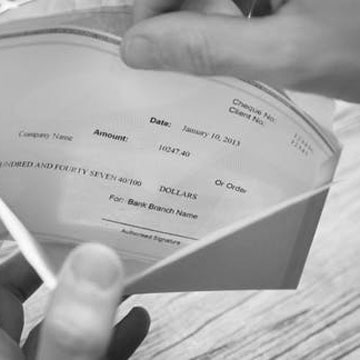ARE ELECTRONIC PAYMENTS TAKING THE PLACE OF CHEQUES
What are the Best & Safest Options for Payroll & B2B Payments in 2020?
Most companies across Canada still rely on cheque payments for Salary and B2B payments, but seriously, how do we react when stuck behind someone paying for their groceries by cheque in the supermarket? Let’s be honest – getting stuck behind that one person using a paper cheque in stores is an absolute pain. We stand there wondering how they could possibly find it convenient to carry around their chequebook and pay for stuff with it these days instead of just using a debit or credit card like the rest of the modern world!
Electronic payments are obviously mainstream in the world of consumer purchases and for paying regular bills, in fact, a recent GoBanking survey revealed that 38% of North Americans NEVER write a paper cheque now. The majority of those that do write paper cheques only do so a few times a year or at most once a month. Why then have so many companies still stuck to their cheque books and cheque runs?
In B2B payments & Salary payments many businesses still use paper cheques even though setting up an electronic payment system could benefit their business in many ways.
Not only are there cost-saving reasons for switching to an electronic payment system, like cutting down on cheque-processing costs, handling and postage, but it’s safer as well. In these times where Fraud could almost be considered mainstream, here are a few reasons why paper cheques are not as safe as we may think for B2B & salary payments.
Cheques Have All the Companies Valuable Information Printed on it!
The Bank account number, business name, and routing number are all a potential fraudster needs to access the money in a business chequing account. A valid cheque will also include the signatures of authorized owners/personnel – all this essential information for fraudsters is conveniently located on the front of business cheques, leaving the company open to fraud.
Unlike a business credit card, which usually comes with fraud protection and is “money yet to be paid”, if a company falls prey to fraudsters taking funds from the bank account, an unauthorized withdrawal is real money deducted from the business chequing account balance. While any potential Bank issues caused by fraud are a problem, this could actually cause a business to fall short of necessary funds required to pay immediate financial obligations like employee salaries or suppliers, causing a rapid and real threat to the Company operation.
Cheques are Handled by Many People, both Inside & Outside the Company
 From administrative personnel, to the post office system, and finally to suppliers or staff, paper cheques are physically touched by many people before reaching their destination. And even when the destination is reached, this doesn’t mean it’s safe.
From administrative personnel, to the post office system, and finally to suppliers or staff, paper cheques are physically touched by many people before reaching their destination. And even when the destination is reached, this doesn’t mean it’s safe.
Even if everything possible is done to safeguard company cheques while in the business itself, cheque fraud can also occur at a supplier’s location. Cheques may be handled by any number of staff at the recipient’s end and could sit on top of desks for days before being cashed. In addition, cheque information will be stored in file cabinets for years, leaving them vulnerable.
Cheques are too Easily Duplicated (Although Duplication isn’t even Needed)
As we all know, cheques can be easily duplicated with today’s technology. Armed with complete banking information, scammers can easily replicate cheques and make them look like the real thing. If a scammer has account and routing numbers, they can easily use just that to make purchases.
This boils down to one important point—the security features on traditional paper cheques developed decades ago are becoming ineffectual in today’s electronic world.
These days, a scammer doesn’t even need to replicate or alter a paper cheque in order to steal funds. Authentication, in the form of signatures and cheque security features that businesses relied upon are becoming obsolete in today’s online world. Even if a scammer can easily duplicate and design a realistic-looking paper cheque with forged signatures to defraud a Company, they don’t need to in order to access Company money.
Banking, Payments & Payroll are Better Done Electronically
 Business owners that have been writing paper cheques for decades don’t usually realize that cheques are not as safe as they used to be. They also often think that switching to an electronic payment system is costly or time-consuming. With the right technology, this couldn’t be further from the truth.
Business owners that have been writing paper cheques for decades don’t usually realize that cheques are not as safe as they used to be. They also often think that switching to an electronic payment system is costly or time-consuming. With the right technology, this couldn’t be further from the truth.
There are AP Automation solutions available that work with most popular accounting software and automate the entire payment process. However, this doesn’t mean any lack of control over payment dates. In fact, it’s just as easy to select the pay dates for each invoice or pay cheque as it is with a paper cheque – probably easier. In addition, the preferred electronic payment method can be securely saved so that there’s no repetition inputting this data for every vendor payment, saving time and money.
Not only will time and money be saved from cheque processing by implementing AP Automation and ACH Payments, this will help prevent fraud associated with paper cheques as well.
Reasons to Switch to Electronic Payments from Cheques
There are many reasons for both businesses and consumers to use direct deposit including:
- Automated deposits: When receiving funds by direct deposit, the funds are added to an account without any action required by the recipient. Whether out of town or too busy to make it to the bank and deposit a cheque, an account will be credited – which is great for pay cheques.
- No mail or paper: With electronic payments, there’s no need to print cheques or any cost incurred to mail them. Payees don’t need to keep checking their mailbox. Also, payments don’t get lost if the process is set up correctly the first time.
- Electronic records: Everybody has a record of the payment, and it’s easy to see what happened in the account’s transaction history. There’s no need to manually write down details about payments, and there’s no chance of losing that deposit slip.
- Security: Moving funds electronically means nobody can steal a cheque, alter it, or attempt to cash it. The funds seamlessly move from one account to another.
- Cost: It’s generally free to receive direct payments and sending funds by ACH is often less expensive than other options. Also, there’s no need to order blank cheques, envelopes or postage, and no need to have someone to process and handle them, then take them to the post office. Saving time in repetitive payment processes saves money.
- Faster pay: Sometimes payees get paid sooner, with deposits arriving in a person's chequing account a day or two earlier than a paper cheque arrives in the mail. Plus, the funds are available for spending immediately, and there’s no need to deposit the cheque and wait for it to clear.
- Accuracy and Avoiding Embarrassment: We know it shouldn’t happen, because all small business owners keep accurate and timely management accounts with full cashflow forecasts, right? But seriously, there’s always that one occasion when a larger payment cheque doesn’t get cashed right away, then drops into the bank at just the wrong moment when the business owner thought the funds had already been paid out and so stocked up with something on special offer thinking the Company could afford it… Never happened? We’re not buying that!
- CRA and Government Remittance: With Electronic payments, it’s easy to pay federal and provincial government remittances, with all required forms built-in and to pay remittance as early as next business day, scheduling remittance of source deduction with payroll direct deposit in one easy and automatic operation.
We can help you get the right information to make the best choice for your payroll and B2B payments for your Small Business in White Rock, Langley or Surrey, BC. Here at Green Quarter Consulting - Accounting and Bookkeeping Services for Small Businesses in White Rock South Surrey, Langley and Surrey BC, we navigate Small Business Owners with analyzing transactions, sources of income and your tax risks and how they relate to your business strategy.
Contact us today at 778-791-2864 or 604-970-0658, let’s talk, or send us an email here and we will be in touch very shortly.
GET YOUR FREE CONSULTATION TODAY

